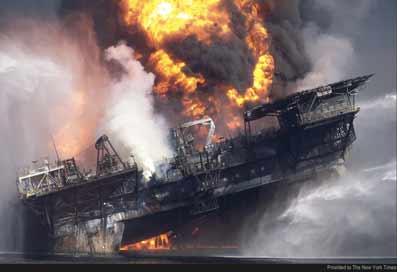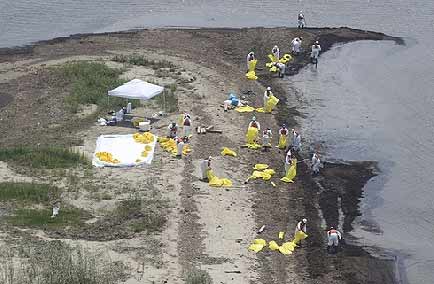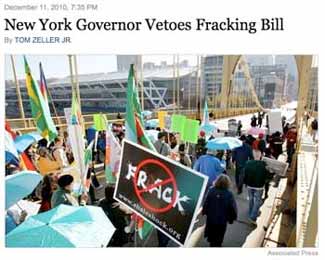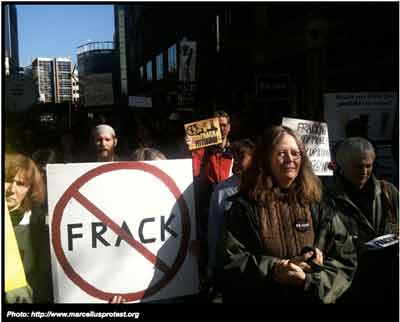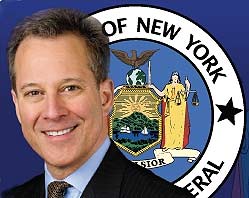Contains the keyword government
A leading congressional critic of shale drilling is scolding the Obama administration for failing to try to slow drilling in the Northeast's Marcellus Shale.
Rep. Maurice Hinchey (D-N.Y.) fired off a letter (pdf) yesterday to the commander of the North Atlantic Division of the Army Corps of Engineers, Brig. Gen. Peter "Duke" DeLuca. DeLuca represents the federal government on the little-known but powerful Delaware River Basin Commission (DRBC), and he rebuffed Hinchey's request that he use his vote to block gas drilling there until a lengthy study is completed.
See: Keystone XL Pipeline - Issues
Both Hinchey and Johanns have been rebuffed by the President and the State Department. Might this be telling us about the direction the Administration is taking in regards to its Energy Policy? nz
See: Obama Admin Rejects Timeout for Natural Gas Drilling in N.Y., Pa.
See: What President Obama should have said about natural gas.
See: In Pa., Rove tells Marcellus shale drillers: Expect 'sensible regulation'
On May 22, 2010 President Obama established the National Commission on the BP Deepwater Horizon Oil Spill and Offshore Drilling through Executive Order 13543 issued on May 21, 2010.
Presentation of the findings and recommendations in the National Oil Spill Commission’s final report on the causes of BP’s Gulf rig blowout and prevention of future disasters will be held 11am EST, Tues., Jan 11, 2011 at the The National Press Club: 529 14 St., NW, Washington DC.
Viewing: Credentialed press only. Public viewing available via live stream at www.OilSpillCommission.gov.
See: The Ceres Principles | Mixplex
See: Before the Big Spill | Mixplex
See: BP Deepwater Horizon Committee Hears From Oil Industry Executives | Mixplex
The National Energy Technology Laboratory (NETL). Website: U.S. National Energy Policy Key Issues & Mandates, Secure & Reliable Energy Supplies.
See: Energy Policy Act of 2005.
"How much of our fossil energy will come from domestic rather than imported sources?
Can we realize the benefits of fossil energy while meeting environmental goals and controlling global climate change?
Can our energy infrastructure reliably deliver energy to the marketplace in the future?
Recent focus on U.S. energy price, availability, and security has resulted in publication of a number of studies and proposals for legislative action. Click here to read more about this issue."
Assembly Speaker Sheldon Silver and Environmental Conservation Committee Chair Robert K. Sweeney announced the passage of legislation (A.11443-B) that would suspend the issuance of new permits for natural gas or oil drilling involving hydraulic fracturing, known as hydrofracking, until May 15, 2011.
"This moratorium will help ensure that the hydrofracking process will only be allowed in New York after a thorough, deliberate and unrushed analysis of the process is complete," said Silver (D-Manhattan). "By preventing the state from issuing new permits to oil and gas companies until further review, we have protected our water supply and served notice to the industry that the health and safety of New Yorkers is our top priority."
Hydraulic fracturing involves pumping water and chemicals under pressure to create fractures in rock containing natural gas or oil. The resulting fractures permit the natural gas or oil to be captured. Concerns have been raised about the potential environmental and health impacts of the chemicals contained in the hydraulic fracturing fluid. Currently, the Environmental Protection Agency is conducting a study to investigate the possible relationships between hydraulic fracturing and drinking water.
"Decisions regarding the safety of our water and air shouldn't be made in haste, but should be the result of careful study and deliberation," said Sweeney. "If the water has been polluted it will be too late. This legislation will remove any 'time pressure' and allow DEC to do its job correctly."
Will Governor Patterson Veto this Bill?
“Even with the tremendous revenues that will come in at this time we’re not going to risk public safety or water quality, which will be the next emerging global problem after the energy shortage,” he told WAMC-FM radio last week. “At this point, I would say that the hydrofracking opponents have raised enough of an argument to thwart us going forward at this time.”
Zeller, Tom. "New York Governor Vetoes Fracking Bill." The New York Times: Greenwire, December 11, 2010.
Gov. David A. Paterson of New York on Saturday vetoed legislation intended to curtail natural gas development using the technique called hydraulic fracturing until a closer review of its effects can be undertaken.
Instead, the governor issued an Executive Order instituting a moratorium that extends until July 1, 2011 — beyond the date specified in the legislation — and that more narrowly defines the types of drilling to be restricted.
“This legislation, which was well intentioned, would have a serious impact on our state if signed into law,” Mr. Paterson said in a prepared statement. “Enacting this legislation would put people out of work – work that is permitted by the Department of Environmental Conservation and causes no demonstrated environmental harm, in order to effectuate a moratorium that is principally symbolic.”
See: Sue Smith-Heavenrich. The Marcellus Effect. December 15, 2010. "No Moratorium And No Horizontal Hydro-Fracking".
Assemblywoman Barbara Lifton explained that an Executive Order, no matter how good, is second best to legislation. A statute, she points out, would not face the risk of being rescinded by Governor Cuomo when he takes office.
“There was also a lot of misinformation from the industry,” Lifton said. Regardless of how safe people insist the current drilling technology is, there are problems with vertical wells. That’s why the moratorium included vertical wells, Lifton said. Indeed, it was vertical Marcellus wells that contaminated the drinking water wells in Dimock, PA.
What does the Executive Order really say? Not much, when you really read it...
See: Sharon Wilson. December 15, 2010. Bluedaze. "The giant loophole NY Gov. Patterson gave industry".
I've kept quiet on the Patterson executive order to hault fracking because something smelled funny about it. Why veto the moratorium then issue an EO? That didn't make sense to me.
The Marcellus Effect blog explains how Patterson is having his cake and eating it.
His giant loophole allows vertical fracking so watch for a big rush on vertical permits. Industry will chop down a bunch of trees and get their vertical pad sites all ready for when the EO expires. Then all they have to do is apply for a change of permit.
There's always a loophole.
See: Energy in Depth. Dec. 2, 2010. "Live From New York…"
See: Sarah Hoye. Dec. 2, 2010. CNN. "New York could be first state to ban controversial drilling practice".
See: Peter Mantius. Dec. 1, 2010. DC Bureau. "New York Assembly Delays Fracking Until May 2011".
Office of the Attorney General, New York State. Eric Schneiderman.
Oil and Gas Leases: Land Owner Rights and Land Owner Tips.
Problems with Landmen
Misleading or Misunderstood Statements
1. “Your property will [or won’t] be in the unit.”
2. “This is the standard lease, and it’s not negotiable”.
3. “All your neighbors have signed, and you’re the sole person holding everything up”.
4. “Don’t you want to receive $X every month”?
5. “If you don’t sign, we’ll take the gas from your property without paying you”.
Feeling Under Pressure? Consider the Following:
1. Obtain the full name, address, and telephone number of both the landman and the business they represent.
2. Direct the landman to leave the property and to not return or contact you again.
See: Jon Campbell. Star-Gazette. Nov. 7, 2010. "Attorney General-elect Schneiderman staunchly opposes hydraulic fracturing."
Eric Schneiderman, a Democrat who handily defeated Republican gas-drilling supporter Dan Donovan on Tuesday, has said he will sue to stop the controversial drilling process of hydraulic fracturing -- until it is proven safe -- and aggressively go after drillers who break the rules."
NYSDEC Main Page on Marcellus Shale.
Hydraulic fracturing of the Marcellus Shale will require large volumes of water to fracture the rocks and produce the desired amount of gas. Each well may use more than one million gallons of water.
See: NYS Dept. of Environmental Conservation (NYSDEC): Bureau of Oil and Gas Regulation
NYSDEC is criticized for not having enough personnel to monitor gas drilling.
There is currently no Section Chief for the Compliance and Enforcement Section of the NYS Dept. of Environmental Conservation (NYSDEC) Bureau of Oil and Gas Regulation. Jack K. Dahl, Director. (518) 402-8056.
See: NYS Dept. of Environmental Conservation (NYSDEC): Draft Supplemental Generic Environmental Impact Statement (dSGEIS) on the Oil, Gas and Solution Mining Regulatory Program
The draft Supplemental Generic Environmental Impact Statement (SGEIS) for potential natural gas drilling activities in the Marcellus Shale formation was available for public review and comment through 12/31/09.
The draft SGEIS supplements the existing Generic Environmental Impact Statement (GEIS) and analyzes the range of potential impacts of shale gas development using horizontal drilling and high-volume hydraulic fracturing.
The draft SGEIS outlines safety measures, protection standards and mitigation strategies that operators would have to follow to obtain permits.
Comments - The public comment period ended on 12/31/09 and the Department is now evaluating the many comments received. Watch this page for updates.
State of New York, Department of Environmental Conservation (NYSDEC). 2009. Draft Supplemental Generic Environmental Impact Statement (SGEIS). (804 pages, PDF, 22.77 MB)
What is wrong with New York in regards to gas drilling?
See: The U.S. Forest Service page below.
In New York, the Finger Lakes National Forest - Projects & Planning page contained no information on Oil and Gas Leasing.
BILL NUMBER:S8129. Passed 48-9. Aug. 3, 2010.
See: Patterson Veto and updates on Marcellus Shale legislation from E2 Law Blog.
See: Solid Shale
Solid info for NYS citizens who want their grandkids to be able to walk on unpolluted ground.
This is the place to read about bills having to do with gas exploration and extraction that are under consideration, and then read what others think about them in the comments (or share your own thoughts!).
See Assembly Bill, A1322c. "An act to amend the environmental conservation law, in relation to environmental protection related to the drilling of oil and gas wells, and providing for the repeal of certain provisions upon expiration thereof".
Pictured in still frame: George Winner, who voted against the Bill.
See: Transcript (PDF 99k)
TITLE OF BILL: An act to suspend hydraulic fracturing; and providing for the repeal of such provisions upon the expiration thereof
PURPOSE OR GENERAL IDEA OF BILL: This bill seeks to place a suspension of any permitting for hydraulic fracturing low permeability natural gas reservoirs, such as the Marcellus and Utica shale formations to ensure adequate review and analysis of the effects of this type of drilling on water quality, air, environmental, safety and public health.
SUMMARY OF SPECIFIC PROVISIONS: This bill suspends the issuance of new permits for the drilling of a well which utilizes the practice of hydraulic fracturing for the purpose of stimulating natural gas or oil in the Marcellus Shale formation.
JUSTIFICATION:
The potential for development of natural gas drilling in the Marcellus Shale formation within New York State has created robust debate involving the interplay between job creation and protection of the environment. Stakeholders both in support and opposition to these developments are aggressively advancing positions that are expansive and highly controversial.
By delaying DEC's ability to issue permits until May 15,2011, this bill will provide the Legislature additional time to assess the true environmental impacts of horizontal drilling and hydraulic fracturing.
This bill will also allow the Legislature to properly deliberate the numerous concerns that have come forward during the public comment period on the Department of Environmental Conservation's draft Supplemental Generic Environmental Impact Statement (draft SGEIS).
The May 15,2011 date also ensures that the Legislature will have ample opportunity to act in the 2011 Legislative Session. Gas drilling carries with it risks of accidents, including blow-outs and hazards related to gas seeping from wells. There are also potential effects on the communities in which shale gas production is located, including traffic, noise, and an influx of transient workers. Air quality, road creation, and habitat destruction all need to be taken into account, but by far the biggest concern is water safety.
The large withdrawals of water required for hydrofracking could disrupt surface and ground water ecosystems, and improper management of drilling and hydrofracking chemicals, drilling waste, and wastewater could pollute surface water and/or groundwater.
Given the complexities of the environmental and policy issues under consideration, the need for a one year suspension on the permitting process for development of natural gas drilling in the Marcellus Shale formation cannot be overstated. This will allow for a thorough, deliberate and unrushed analysis of all factors involved.
PRIOR LEGISLATIVE HISTORY: New bill.
FISCAL IMPLICATIONS: None.
EFFECTIVE DATE: This act shall take effect immediately, and shall expire and be deemed repealed on May 15, 2011.
S8129B Votes
Ayes (48): ADAMS, ADDABBO, ALESI, BONACIC, BRESLIN, DEFRANCISCO, DILAN, DUANE, ESPADA, FARLEY, FLANAGAN, FOLEY, FUSCHILLO, HANNON, HASSELL-THOMPSON, HUNTLEY, JOHNSON C, JOHNSON O, KLEIN, KRUEGER, LARKIN, LAVALLE, LEIBELL, MARCELLINO, MCDONALD, MONTGOMERY, NOZZOLIO, ONORATO, OPPENHEIMER, PADAVAN, PARKER, Peralta, PERKINS, RANZENHOFER, ROBACH, SALAND, SAMPSON, SCHNEIDERMAN, SERRANO, SEWARD, SKELOS, SMITH, SQUADRON, STACHOWSKI, STAVISKY, STEWART-COUSINS, THOMPSON, VALESKY
Nays (9): AUBERTINE, GRIFFO, LANZA, LIBOUS, LITTLE, MAZIARZ, VOLKER, WINNER, YOUNG
Abstains (2): DIAZ, KRUGER
Excused (2): GOLDEN, SAVINO
The Obama administration has decided against pressing for a temporary halt to Marcellus Shale drilling in Pennsylvania and New York, a key federal official said.
Brig. Gen. Peter "Duke" DeLuca, commander of the North Atlantic Division of the Army Corps of Engineers, last week declined a request from Rep. Maurice Hinchey (D-N.Y.) to use the federal government's vote on the Delaware River Basin Commission (DRBC) to seek a temporary ban on gas production in the Delaware watershed.
Hinchey wants drilling there to wait until the commission completes a "cumulative impact statement," but DeLuca said that could delay drilling for years...
...Hinchey wrote DeLuca on Sept. 9, saying he was alarmed that the DRBC is preparing to finish regulations -- which would allow production to start -- this year, before a cumulative impact study could even start. He asked DeLuca to use his seat on the commission to advocate for blocking development until after the study is done.
"It is difficult to understand how the DRBC can consider the release of gas drilling regulations without a comprehensive assessment of the possible impacts in the Delaware River Basin," Hinchey wrote...
Environmentalists say DeLuca is wrong when he asserts that the DRBC must balance environmental concerns with economic development. Jill Wiener, a leader of an upstate New York group called Catskills Citizens for Safe Energy, said the commission's mandate is to protect water quality.
"They owe their fealty to the river and the people of the basin," Wiener said, "not the economic health of a few leaseholders and multinational corporations."
But industry officials say DeLuca was correct to reject Hinchey's request.
"Just to be clear here, Hinchey was trying to use a federal agency to direct the actions of a regional water board for the purposes of preventing the development of natural gas in a state where he doesn't even live," said Chris Tucker, spokesman for Energy in Depth, a group of independent drillers. "Next thing you know, he'll be ordering the Army Corps to build levees around our well sites in Wyoming."
WASHINGTON, D.C., April 1st, 2010 -- In addition to opening up vast areas of our coastline to offshore oil drilling, the Obama administration yesterday elected to defend a Bush-era policy that allows unlimited amounts of our nation's treasured public lands to be used as toxic waste dumps for the multinational hardrock mining industry.
This decision -- in the form of a response to federal litigation filed by a coalition of conservation and Native American groups -- is completely inconsistent with earlier remarks by Interior Secretary Ken Salazar on the importance of updating our federal mineral policies to protect public lands.
"Increased oil and gas drilling off our coasts, and now unlimited toxic waste dumping on our public lands send the message that profits are more important than water, wildlife and communities," said Lauren Pagel, Policy Director for EARTHWORKS, one of the plaintiffs in the case against the regulations. She continued, "With this move the Obama administration, like the Bush administration before it, is abandoning clean water and communities in favor of gifts to extractive industries."
"The administration has claimed support for reforming one of the most outdated laws on the books -- the 1872 Mining Law -- yet they choose to perpetuate the gross giveaways to an already subsidized industry without regard for other valuable uses of the public's land," said Pagel.
She continued, "It's time for the Obama administration to walk their talk when it comes to our shorelines and our public lands, and responsibly balance resource extraction with protections for communities and taxpayers," said Pagel.
While our nation copes with the disaster in the Gulf of Mexico and the multiple failures of offshore drilling regulation that led to it, another potential fossil-fuel crisis lurks onshore.
Hydraulic fracturing, also known as "fracking," injects tens of thousands of gallons of water, sand, and chemicals at high pressure into underground rock formations to release natural gas. The injected fracking fluids are known to include a variety of harmful chemicals, such as diesel fuel, benzene, methanol, and formaldehyde. Even low concentrations of these chemicals can have severe health and environmental consequences, and they are being used near drinking water supplies...
...Some in the industry have said disclosure would reveal proprietary data. On the contrary, just as Coca-Cola must disclose a list of ingredients but not the details of its secret formula, our proposal would ask energy companies to share the ingredients of their fracking fluids but not the specific recipes.
Others have opposed federal regulation on the grounds that state regulations are sufficient. However, only a handful of states have fracking-fluid disclosure requirements, and some don't make the data public.
See opposing viewpoint from Energy in Depth, "House Call on the FRAC Act".







